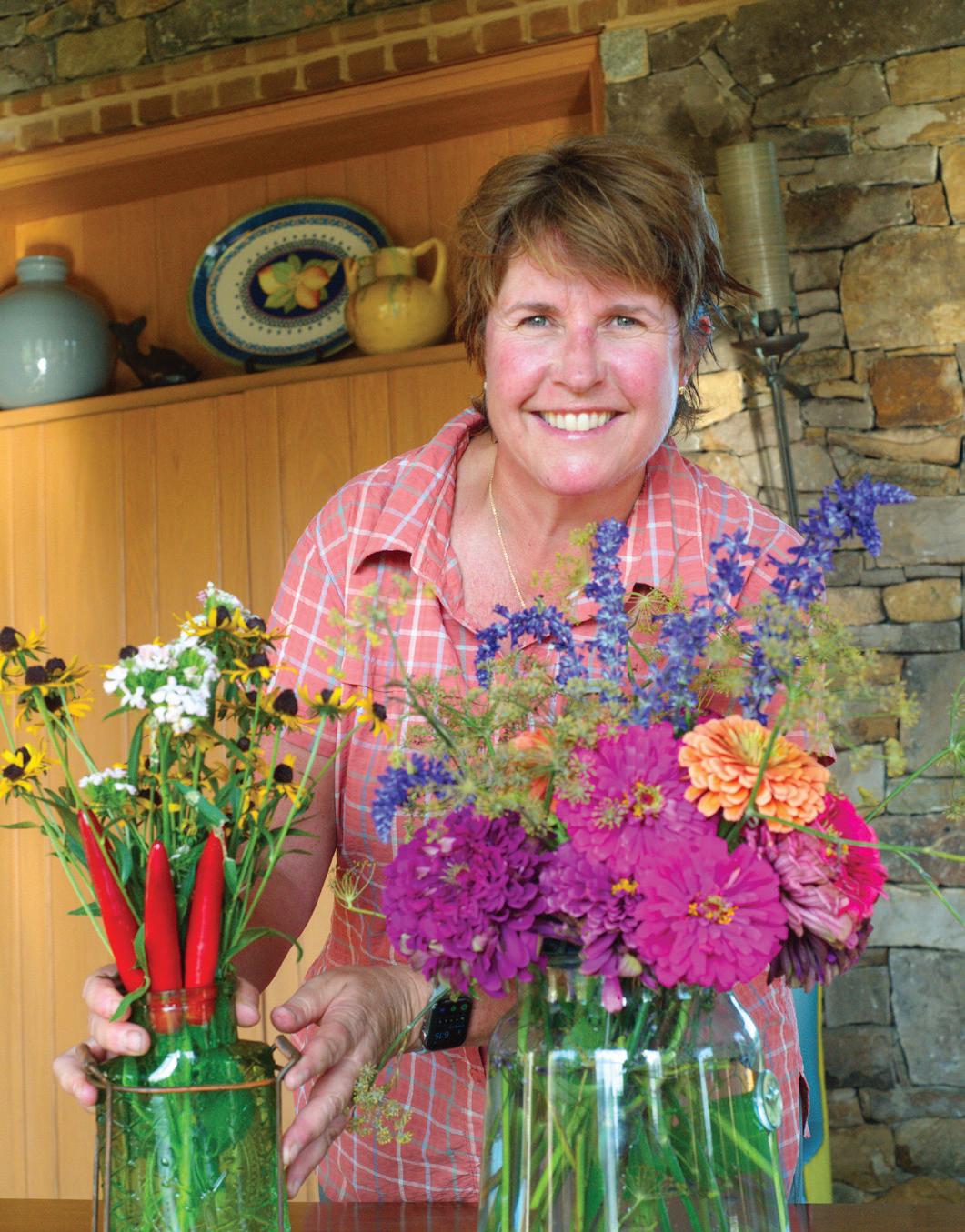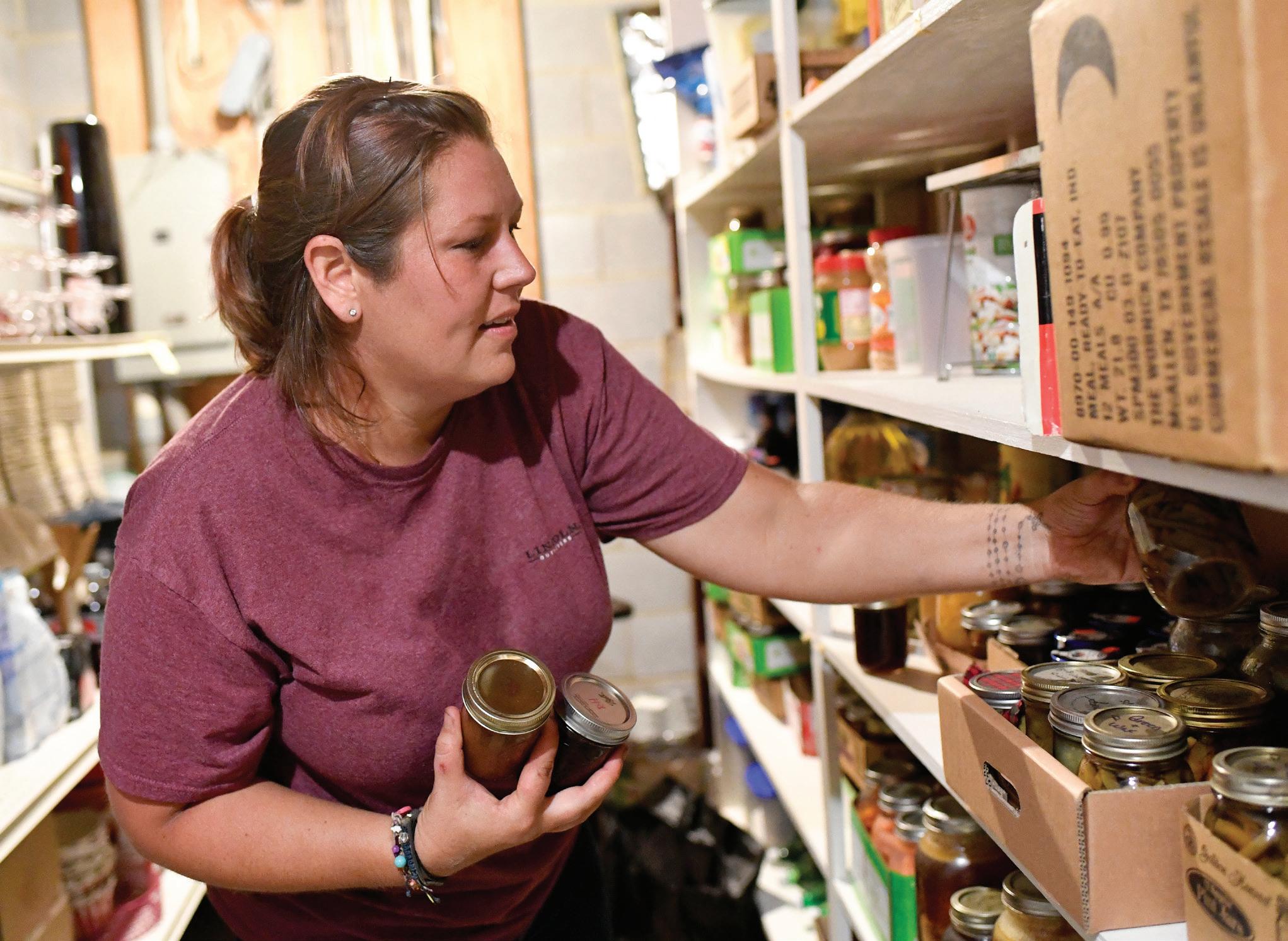
9 minute read
Meet the makers at Moon Shine Mountain Farm
Moon Shine Mountain Farm events
• Nichole and Daniel Stinson offer canning and pickling classes at their farm south of Marshall. • Farm tours are offered through the fall. • Children’s “fun farm days” can be arranged for family or socially-distanced groups of 4-8.
Advertisement
Conservation-minded
Moon Shine Mountain works in conjunction with the John Marshall Conservation District to fence their livestock out of Thumb Run that runs through their property. The incorporate rotational grazing, moving stock from pasture to pasture to minimize mowing and maximize forage growth. moonshinemountainfarm.com
Nichole Stinson says she living her dream life at Moon Shine Mountain Farm, sharing her love of the outdoors, gardening, animal husbandry and farm life with her family and with her community.
Simple days, simple ways
Meet the modern Moon Shiners: These homesteaders are serving up taste treats and a strong buy local, eat healthy message
Learning to live with the land is an ongoing process for this farm family. Meet the Stinson clan of Marshall’s storied Free State region and hear how they’re taking it from farm to table, from pasture to processing, from the land to the hand, and everything in between.
Tucked atop a mountain with a rich history of outlaw moonshining in the Free State area just south of Marshall are 34 acres devoted to something other than illegal alcohol.
Daniel and Nichole Stinson give a nod to the region in the name of the organic farm they created in 2012: Moon Shine Mountan Farm was carved out of their desire to live healthy and know what was going in their bodies. The Stinson’s and their children live on and tend every acre.
“Our Farm started as a dream. The growth of Moon Shine Mountain Farm into a true farm, albeit a small one, has happened organically, pardon the pun.” chuckles Stinson.
Nichole Stinson, who grew up in a HOA community in Maryland, says that through several trials and a few military tours, she and her husband
Poppy Stinson, left, labors alongside her mother, Nichole, in a garden bed at Moon Shine Mountain Farm near Marshall.
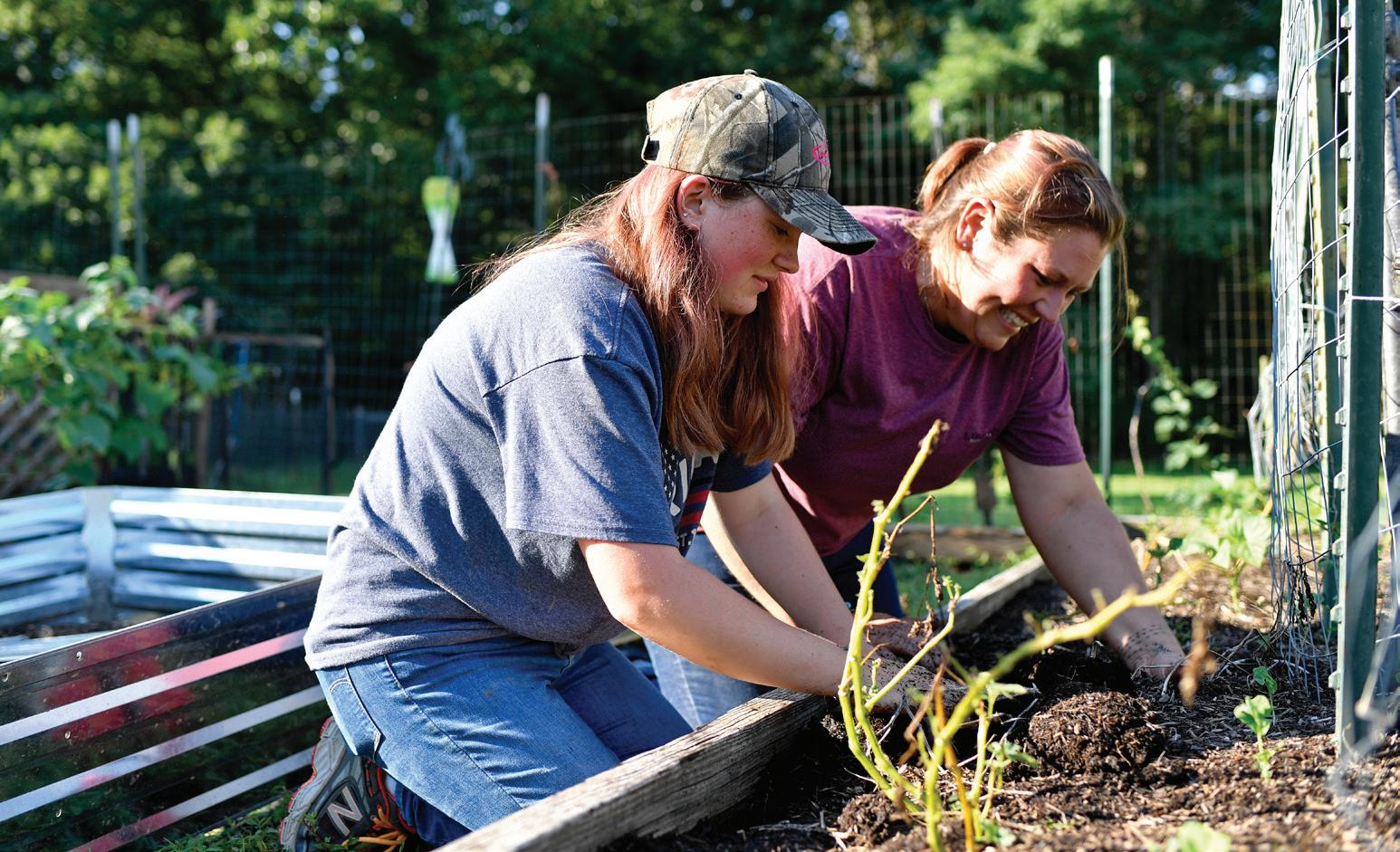
“My farm homestead is my therapy. There is nothing better for my soul than being outside taking in all God’s beauty.” - NICHOLE STINSON
decided a life in the country would be best for them. It was that quest to go back to the earth, live and eat simpler and cleaner that fueled their passion to share with others what they have learned, are still learning, and what they call their, blessings. Stinson says between their natural lifestyle and the joy the animals bring, she and her family have been living the highest quality of life and cannot imagine doing it any other way.
Moon Shine Mountain Farm began with a garden and a few chickens, but, as Stinson jokes, “Chickens are like potato chips, you can’t have just one!” Stinson says the farm is fun for kids of all ages and assures that the herd, which includes Dexter Cattle, sheep, ducks, geese, turkeys, and the chickens, or “ladies”, as she calls them, will come out and follow guests with or without treats.
Produce grows year-round at the farm, with a Spring to Fall outdoor garden and a Greenhouse in the winter. The garden is vital in the Stinson’s goal of self-sustainability and a variety of fruits and vegetables are available depending on the season. Stinson says they focus as much as possible on heirloom vegetables and save their own seeds whenever they can. “Except squash,” admits Stinson, “funny enough, every time we try to grow squash, the squash bugs take over. I’ve resolved to buy it from another local farmer.”
Canning is a huge part of what the Stinson’s do
A tale as old as time…
At the Stinson family’s Moon Shine Mountain Farm near Marshall, they live and work in a natural rhythm, one dictated by the seasons and the circular nature of the birth, life, death renewal cycle of an active stock farm.
“It’s not for the faint of heart,” says Nichole Stinson. “Farming is not an exact science, it’s more like, organized chaos.”
Timeline from farm to table for a beef burger: - Early fall: Dexter calves are born (from young heifers purchased from Dixie Meadows Farm. - March: Calves are weaned and left on a grass pasture to grow. Moon Shine beef is grass-fed and grass-finished. - 13 months later, usually in May: Processing at Fauquier’s Finest. The Stinsons typically keep one side for themselves and sell the rest under their Moon Shine Mountain label.
A taste of Fauquier fall:
Roasted pear and fig compote
4 firm-ripe Bartlett pears 1/2 cup granulated sugar 1/2 cup apple juice 1 tablespoon unsalted butter 1/2 teaspoon cinnamon 1/4 teaspoon allspice 6 dried figs, quartered lengthwise 8 ounces plain yogurt (homemade or storebought) 1 teaspoon vanilla extract 1 1/2 tablespoons superfine sugar
Preheat oven to 425°. Halve the pears lengthwise and core them, then cut each half lengthwise into 3 wedges.
In a large nonstick ovenproof skillet, cook the granulated sugar, apple juice and butter over moderate heat until the butter melts. Stir in the cinnamon and allspice. Stir in the pears and figs and cook for 5 minutes.
Transfer the pears to the oven and roast for 25 minutes, or until tender.
In a small bowl, whisk the yogurt with the vanilla and superfine sugar. Spoon the compote on plates. Serve warm or at room temperature with the yogurt sauce.
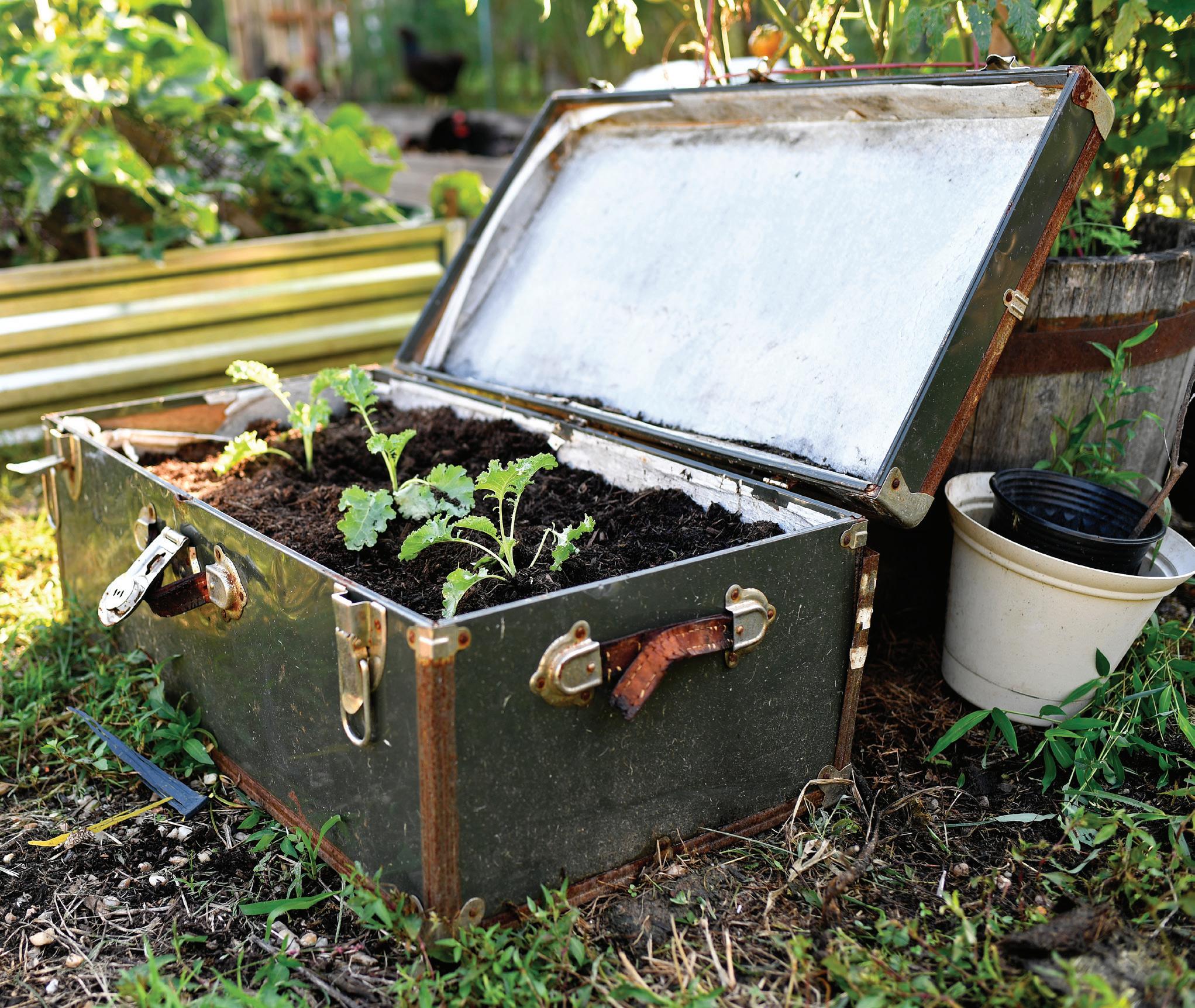
at the farm and has revealed some of their culinary creativity. “We use what we believe to be unique flavor profiles to make our yummies even more yummy,” says Stinson, who is currently in the thick of the jelly; Strawberry Jalapeno, and Habanero Peach Jelly, that is. Pickles, Herb Jellies, and green beans are also on their list to be canned. “We want to help others learn affordable and easy ways to become self-sustainable and we want them to fall in love with farming and think outside the grocery store.”
When asked if they provide weekend entertainment at the farm, Stinson jokes, “Actually, poultry are a good source of entertainment. It sounds weird, but they are quite captivating.” Stinson says they are not looking to be known for sipping hot cider by a fire pit in the fall, and providing entertainment, but are concerned that visitors learn how to create the same haven they have, for themselves.
The Moon Shine crew is hard at work preparing for the busy fall season, bringing in the last of the summer harvest, tending fall crops and making sure recently born chicks and lambs are safe as the weather turns cooler.
On-farm sales are ramping up, with the Stinson clan stocking regular and special-order products daily. facebook.com/moonshinemountainfarm
Shopping list: Usually available at Moon Shine Mountain Farm
Canned goods:
• Pepper jellies: regular, peach, berry • Butters: Apple butter, “apple pie” butter, pumpkin butter, • Herb jellies: Basil peppercorn, mint, lemon-garlic-rosemary • Pickles: Old-fashioned lime, dill, squash pickles • Relishes: Sweet corn, red onion marmalade, spicy pickled radishes
Produce:
• Spaghetti squash, acorn squash, zucchini, cucumbers, tomatoes, kale, chard, lettuce blends, jalapeños, habaneros, Thai chili, sweet potatoes,
Yukon and purple potatoes. • Potted fresh herbs for indoor use through winter
Dried herbs and teas:
• Sage, rosemary, thyme, oregano • Herb blends • Specialty spicy salts • Habanero sugar • Tea blends for sleep, migraines, women’s health, seasonal cold support
Essential oils Animal products:
• Beef Rosemary
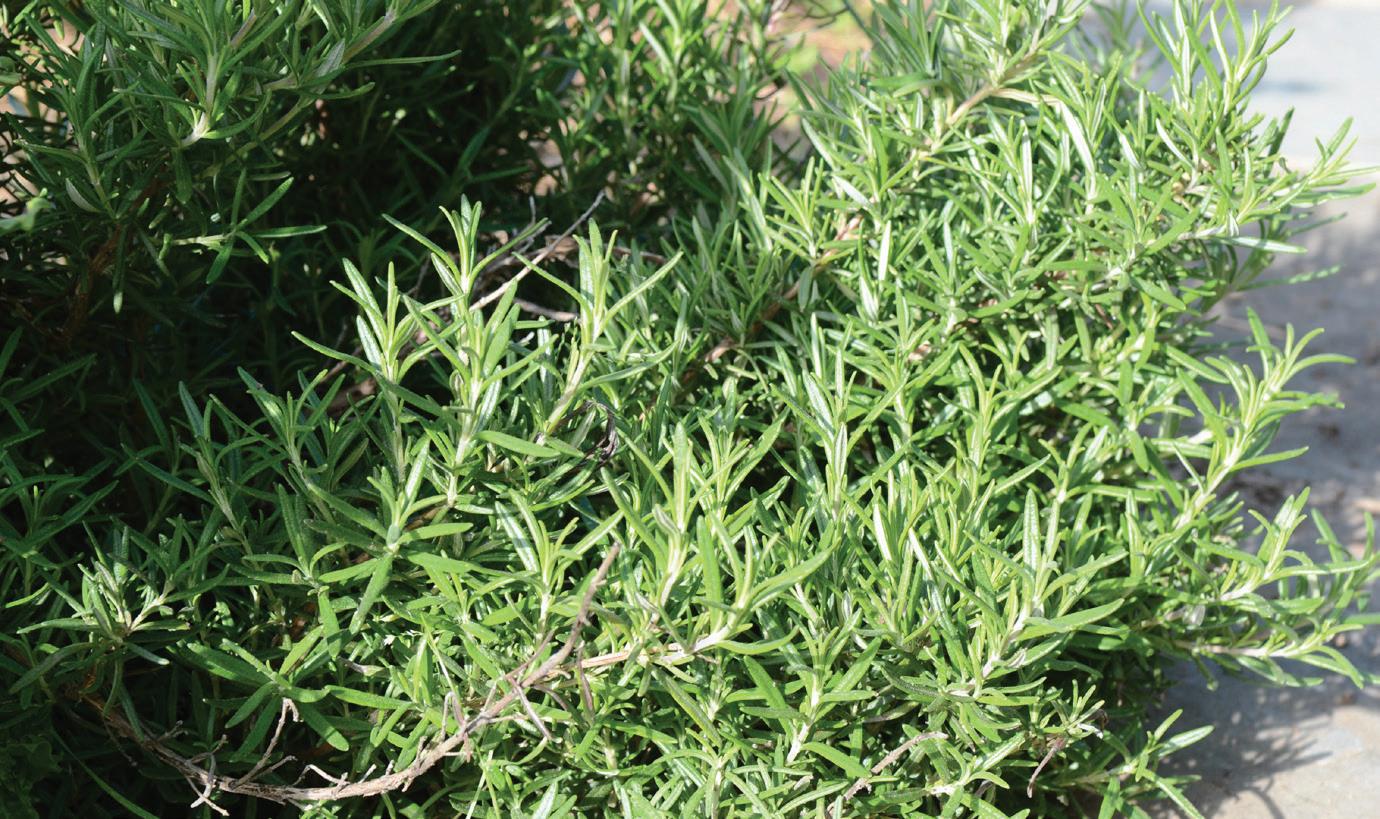
• Lamb • Duck • Eggs (chicken and duck)
Quich and herb breads made to order For fun:
• Poultry feathers • Farm crafts • Bird house gourds.
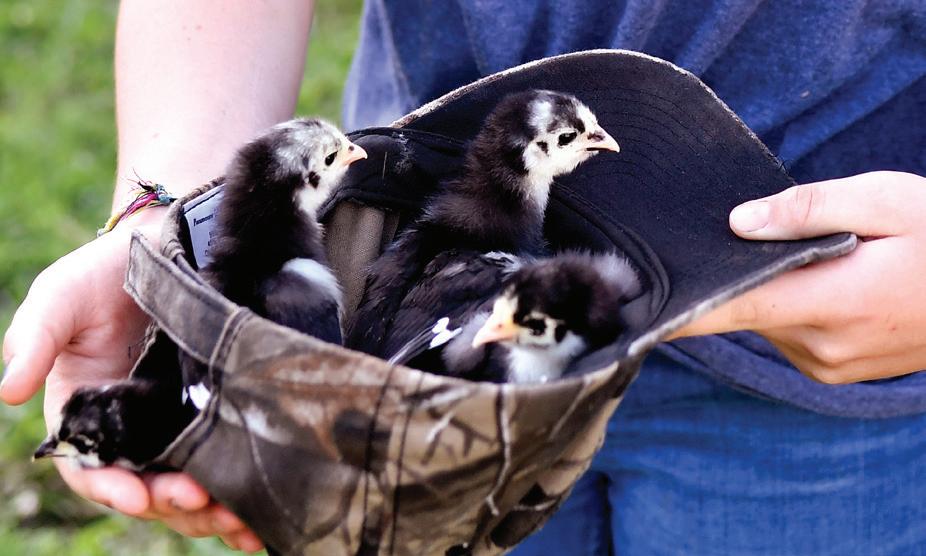
PHOTO BY LEAH CHALDARES Milkweed is celebrated for being a native pollinator plant but don’t underestimate it’s blossom when planning your garden.
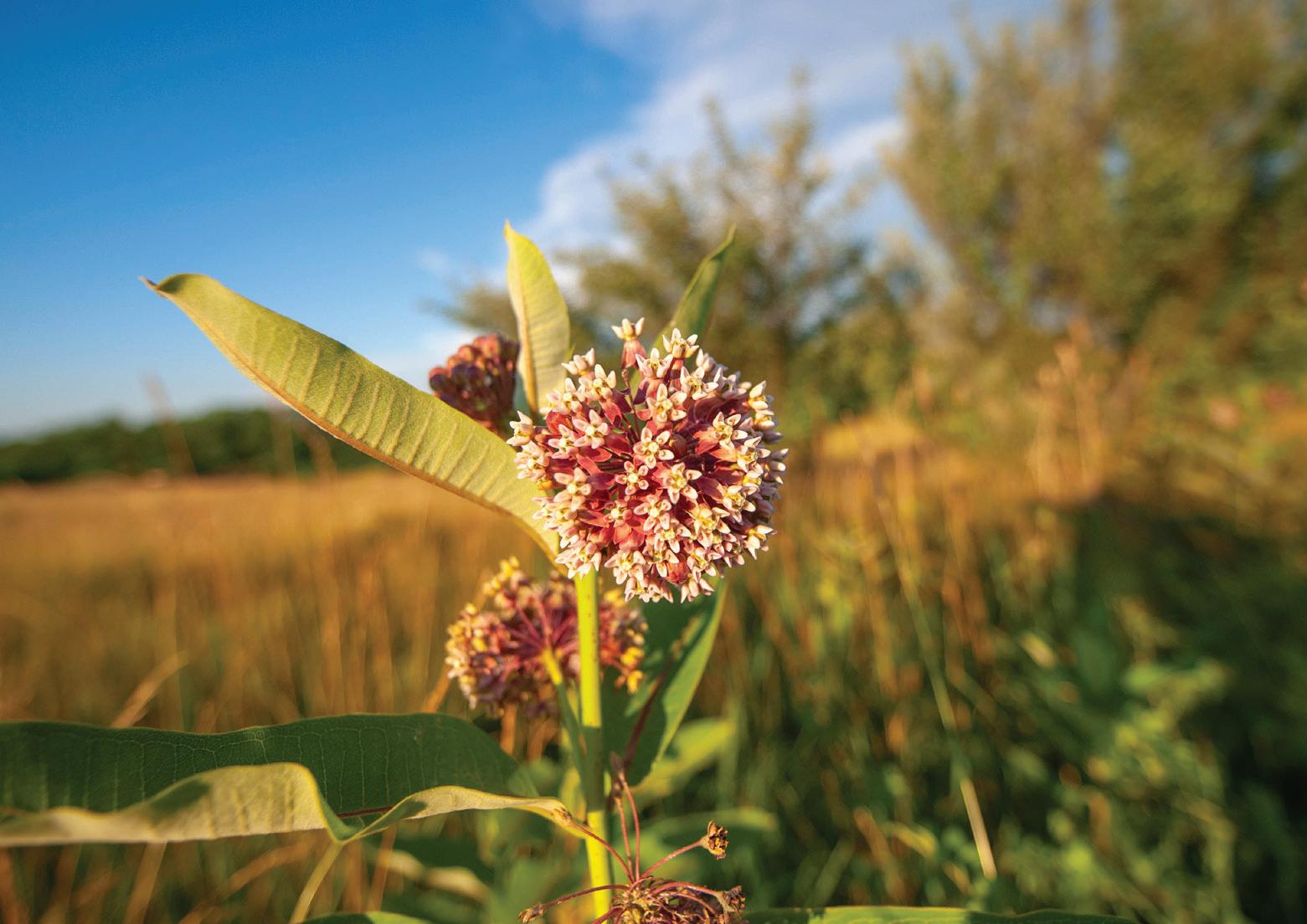
Plant now, enjoy later
A little effort this fall will pay off with early show of spring beauty
Tough and tender at the same time, many spring flowers should be planted in autumn, after the first hard frost.
So now is the perfect time to research, plan and shop. These are ideal socially-distanced activities that can be done alone, with family members nearby or with friends at a one-row’s width distance. • Become an educated consumer by attending field trips or visiting websites, like the Virginia Native
Plant Society. • Test your soil and watch available sunlight over different times
of day and seasons to determine which wildflowers are best-suited for your growing conditions. • Remove existing grass, roots and weeds now. It should be easy, since the growing season is over, and root systems will yield to a firm tug. Turn the soil 8-12 inches, then augment with fall leaves and composted manure. • Select Virginia native plants that grow in this region, since they are naturally adapted to local soil and climate. VNPS has pamphlets – Wildflowers for Woodland Gardens and Regional Native Plant
Nurseries. • Delay planting spring-bloomers until after the first hard frost this fall, since autumn’s variable temperatures could cause seeds to sprout too early if there is a warm spell. • Spread seed evenly over tilled soil.
Avoid bare spots by broadcasting half the seed while walking in one direction, the other half after you turn around. • Lightly tamp seeds into the soil with your hand or foot. Don't rake or cover. • Add rocks or stepping stones to define your beds and pathways between them. • Wildflowers require minimal maintenance, other than weeding and occasional watering if there
aren't regular soaking rains. Many wildflowers are self-sowing perennials, so you may be good for years after one planting. • After the show in early spring, leave most of the spent wildflowers and leaves in your garden bed at season’s end. Decomposition provides valuable nutrients for the next year’s growth. • Native milkweed is critical to migrating monarch butterflies that fly to winter quarters in Mexico each fall. In cool, cloud-shrouded fir forests of Mexico’s central highlands, monarchs cling in clusters to tree branches, protected from the wind and awaiting spring. Late September is peak time to see migrating monarchs in northern Virginia.
Monarchs are dwindling in numbers due to habitat loss and widespread herbicide use. On ag lands and along roadsides, the milkweed species that monarchs rely upon to feed their caterpillars are being depleted by herbicide spraying and roadside mowing. According to Monarch Watch, development eliminates 6,000 acres a day of monarch habitat.
In 2005, the Monarch Waystation project was formed to encourage creation of monarch habitat, including planting milkweed. Seventy gardens in Virginia are registered as waystations. monarchwatch.org





